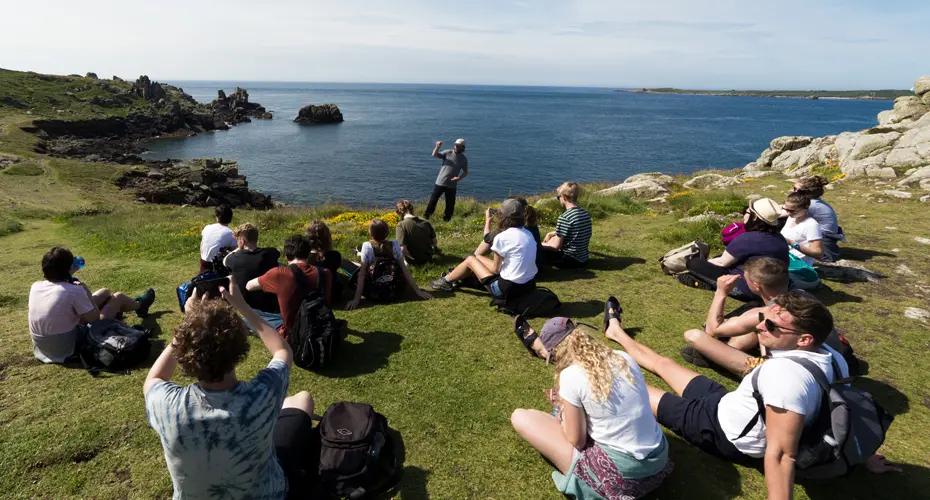Studying
Our teaching is informed by the world-leading research that is performed in the Centre for Ecology and Conservation, and we constantly strive to ensure it is accessible and inclusive for all our students. Our degrees share learning in the field, in lecture theatres and in laboratories, to equip you for your future career in ecological, conservation and wider biological sciences roles, offering you the choice to specialise in your areas of interest.
You will be taught key skills in critical thinking and communication that underpin the scientific process and how to apply this understanding to research in the field whilst developing a deeper understanding of topics such as terrestrial and marine ecology, evolution, animal behaviour, biodiversity and conservation. The transferable skills you gain will be applicable to careers in any sector.

Undergraduate BSc
Our undergraduate degree will prepare you for a future in ecology, conservation, evolution and wider biological sciences, all while studying amidst Cornwall’s natural beauty. Our teaching focuses on hypothesis-driven research led by internationally renown researchers together with dedicated and supportive teaching teams. The diverse range of undergraduate degrees are tailored to your interests, offering two residential field courses at home and overseas, a rich variety of module choices, and your own research dissertation in one of our research themes. Choose between a BSc or MSci, together with opportunities to include a professional placement or a paid year in industry.
4-year MSci
Our 4-year MSci degrees build on the BSc, offering a deeper appreciation of the scientific process though additional teaching and hands-on research experience. The degree will prepare you for a future in ecology, conservation, evolution and wider biological sciences, all while studying amidst Cornwall’s natural beauty. Our teaching focuses on hypothesis-driven research led by internationally renown researchers together with dedicated and supportive teaching teams. The diverse range of MSci degrees are tailored to your interests, offering two residential field courses at home and overseas, a rich variety of module choices, and your own research dissertation in one of our research themes, followed by a final year with masters-level teaching and research opportunities.
Taught Masters
Our taught masters degrees will develop a deeper appreciation of the scientific process though advanced teaching and hands-on research experience, all while studying amidst Cornwall’s natural beauty. The teaching focuses on hypothesis-driven research led by internationally renown researchers together with a dissertation in one of our world leading research themes.
Postgraduate Research (MRes & PhD)
As a postgraduate student at the Centre for Ecology and Conservation you would be joining a thriving community that is among the largest in the world for research into ecology, conservation, evolution, marine biology, and microbial biology. You will benefit from quality research-led supervision and outstanding facilities, all based in the heart of Cornwall's natural beauty.
Our postgraduate degrees will enable you to reach your research potential by offering development opportunities in cutting edge techniques, regular meetings with your supervisory team, access to social and professional events in the thriving early career researcher community, and a dedicated pastoral tutor.
Information for current students
Detailed information for current students can be found on the Current students webpages. Module descriptors and programme specifications can be found on the Study Information webpages.

Study and teaching facilities
Our teaching laboratory is fully equipped to deliver teaching excellence in all of our lab and field practicals. Students will spend a considerable amount of time in the teaching lab undertaking practical work during the course of their degree. A huge variety of practical classes take place including:
- Molecular ecology where students analyse the DNA of fruit flies
- Microscopy - for example looking at microbes in environmental samples such as pond water
- Microbiology where we culture and identify potential wildlife diseases
- Behavioural ecology where students look into cockroach personality traits

Students can borrow equipment from the teaching lab for their practical’s, or projects. Equipment available includes camera traps (trail cams) night vision scopes, Thermal imaging cameras, binoculars and telescopes, bat detectors, hydrophones (to listen underwater), cameras including Go-Pro’s, sound recorders, moth traps, survey equipment, field guides and identification books.
We have a collection of invertebrates for use in outreach sessions and for students to observe in several modules, such as BIO2441: Applied Insect Ecology. The collection currently includes giant African land snails, Indian stick insects, New Guinea spiny stick insects, leaf insects, cherry shrimp, and Madagascan hissing cockroaches.
The Teaching lab also has a large collection of skeletons, taxidermy, and wet specimens, as well as a plant cabinet. These are used for outreach and for several lab sessions throughout the year for students to learn about comparative anatomy.
The Teaching Lab is dedicated to making lab sessions accessible to all, so we have implemented a number of access features that can be requested by students.
We have height adjustable benches in the first row for wheelchair users or students with additional mobility needs, braille labels in key areas, individually bookable workspaces, plus maps and video walkthroughs available online to help students familiarise themselves with the lab prior to their first session.
Some students struggle with the sensory overload of busy lab sessions, so we have created a quiet row at the back of the lab, fitted with privacy screens and an AV screen that live streams the teaching from the lectern, plus an additional quiet space outside of the lab for breaks within sessions.
Further accessible adjustments are arranged on a case-by-case basis.